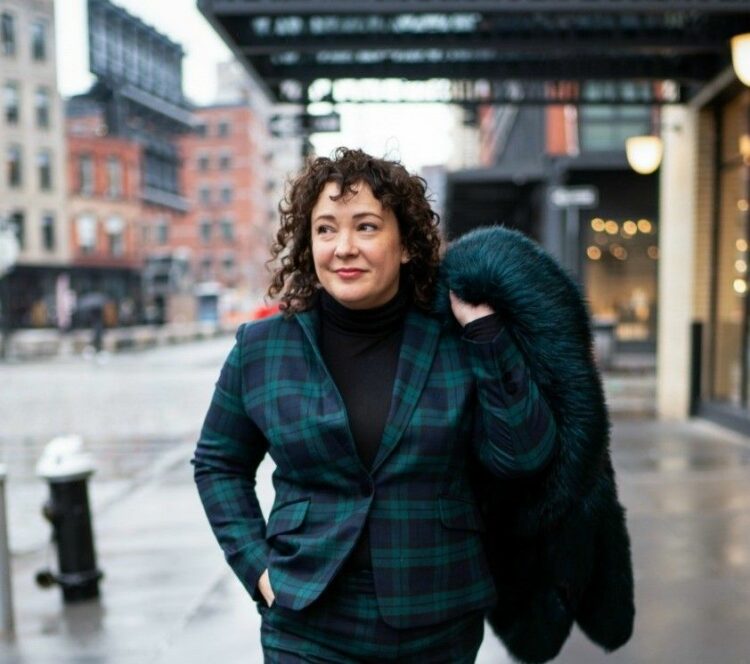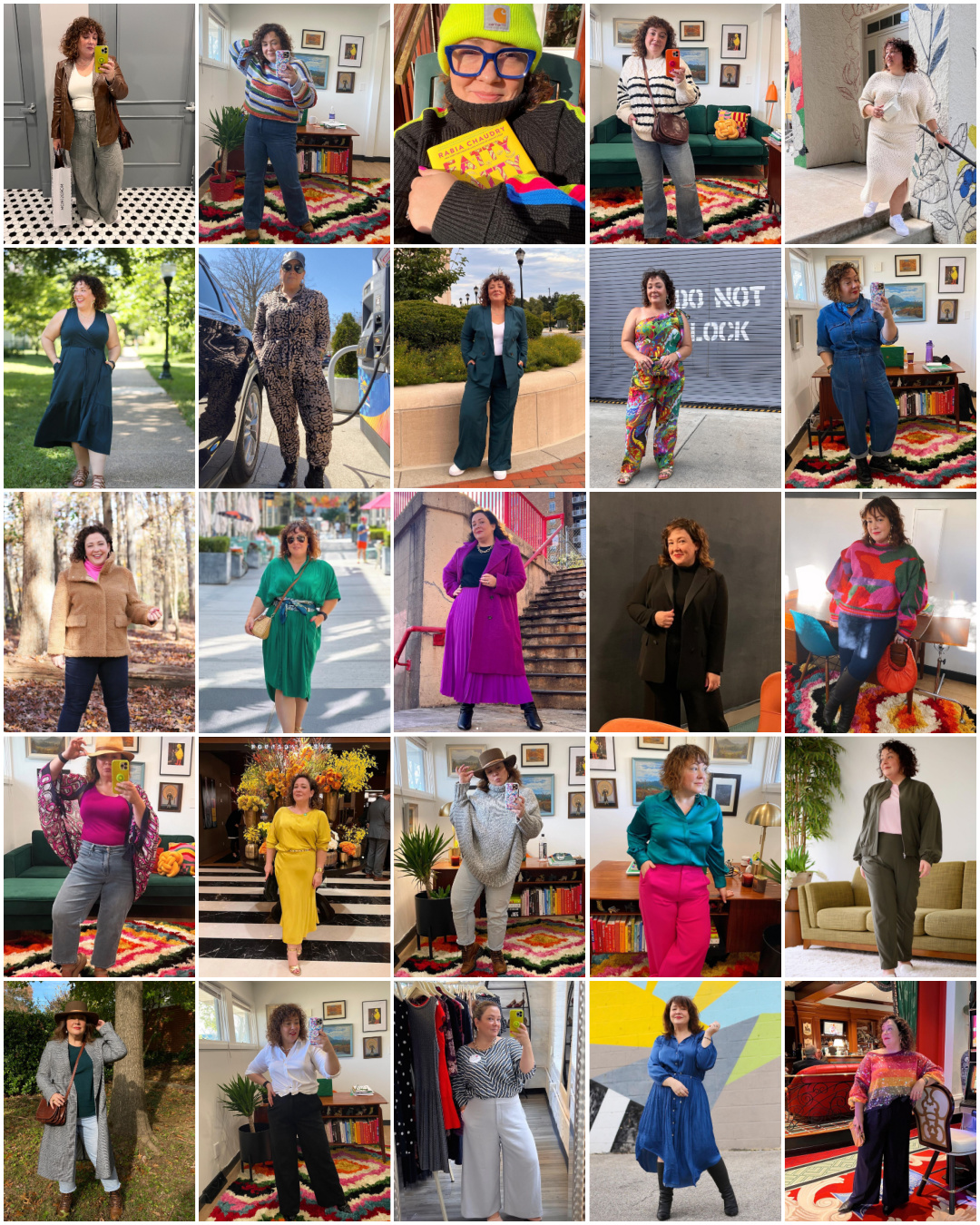Not All Influencers Wear Chains
This month, influencer Lee Tilghman was interviewed by the New York Times. (gift article) Tilghman claims to have left influencing and is much happier now with a traditional 9-5 job. So happy, she has a course you can pay to take and learn from her how to leave influencing. As Tilghman states in this article, “When you’re an influencer, then you have chains on.” As someone who has been in this job for almost two decades (18 years this June), I have a lot of thoughts on this.
Tilghman is better known as @LeeFromAmerica on Instagram. I never followed her, but I did know of her because influencer friends in the wellness, fitness, minimalism, and HAES communities would mention her often controversial ideas of wellness. I think most of my friends “hate followed” her versus being traditionally “influenced” by Tilghman.
@LeeFromAmerica was mentioned enough that I, someone who had no interest in her content, would occasionally check in to see what shenanigans she was up to. I remember when Tilghman left Instagram. Because she was known for being controversial, folks even questioned her motives for leaving.
As a fellow influencer, I felt for her. I saw how scrutinized she was for her beliefs and methods of influencing. As a veteran influencer, I knew that while the attention and the money may at first feel amazing, it likely was taking an emotional toll. I hoped her time away gave her peace and clarity; maybe never returning would be the best thing for her.
I was surprised and a bit disappointed that Tilghman came back with a brand new persona, a complete 180 from her wellness persona, but still just as chronically online. I noped out. I didn't want to know what she was doing next, I felt it was like rubbernecking a car accident.
That is, until a friend informed me that Tilghman started a Substack where she was discussing being an influencer, how unhealthy it was, and how she was working to go back to a normal life. THIS was what I was hoping Tilghman would address after her Instagram break. I signed up.
Not All Influencers Wear Chains
Again, I was disappointed. What could have been incredibly refreshing and honest again felt like another manufactured persona. Even the name of the newsletter and its focus changed in its short existence. When she began advertising a course on how to be just like her and quit being an influencer I knew that she never left influencing, and I also knew that traditional media would eat that shit up as the next viral clickbait talking point.
I was surprised it took so long for a traditional media platform like The New York Times to write about Tilghman. Her story is perfect for the over-40 set who finds all influencing to be superficial and stupid and the demise of society as we know it. It is also perfect for those who dreamed of rage quitting their cubicle jobs, traveling the world, and making tons of money from smiling with bottles of protein drinks, CBD oils, anti-aging serums, gummy vitamins, laxative teas, hair masks, makeup primers, or chalk paints. And yes, it is perfect happy hour discussion fodder for all of us who followed (or hate followed) Tilghman and other chronically online influencers.
I've started and deleted many responses to this article. So many were defensive. Not all influencers! THIS, not influencing as a whole, is why influencing gets a bad rap. The problem is assuming all influencing is the same and that all influencers have the same reasons for having such a job. There are bad apples in every industry. And every industry has nuances.
This isn't about Tilghman, it's about influencing as a whole. And my defensiveness is because mainstream media, and even fellow influencers like Tilghman assume we all run our business in the same manner.
In 2019, I attended a workshop led by influencing expert Brittany Hennessy.
I've taken several courses in my field over the years, but this one from Brittany Hennessy was one of the best. And in this workshop, Hennessy shared something that changed my mindset about influencing and my focus in this position. Influencers can be summed up into two categories: those who wish to be churches, and those who wish to be schools.
I come from a family of teachers, from elementary school educators to college professors. I used to say that I was the first generation to break this tradition, but after that workshop with Brittany Hennessey, I realized I too am a teacher, and Wardrobe Oxygen is a school.
If you choose to be a church, you are a leader with followers. You are the face of your house of worship, and your words are associated with your face. The larger your church, the more recognizable you are. And the larger your church, the more scrutiny you will get. What you say, how you say it, where you say it, what you're wearing as you say it, who you choose to associate with, and how you fund your church may be questioned.
If you wish to be a school, you are choosing to share your knowledge with a community. You may employ additional teachers who will also share their knowledge with the community. Folks may not even recognize you in passing, but they know the work of your institution. Criticism is usually based on your content, not your character.
Both a church and a school can do good for a community.
It is difficult leading a church, and it is difficult running a school. Both require money to exist, and to grow. To get that money there are different methods, some which can be similar but when it comes to a church, the way to differentiate yourself from others is by your leader. When it comes to a school, the way to differentiate yourself is by your curriculum.
And when you have a school, you can lock the doors at the end of the day. A church keeps its doors open. I can go a week without being on social media and maybe one person will DM me and ask what's up. I've taken breaks without anyone even realizing it. However, my friends who are churches (and very good churches) will get dozens or even thousands of queries as to their whereabouts if they take a weekend off social.
There have been times since I started Wardrobe Oxygen when I considered converting my school into a church. And there have been times when I tried to be both. When influencing became a THING, the default was to be a church. Share yourself, be an expert in your niche while also being a trusted friend. Guide your followers to become better versions of themselves, with you leading by example.
But this concept is a recipe for burnout and becoming a sellout.
Being constantly online is exhausting, all-encompassing, and requires some return on that investment of time and energy. Enter sponsored content, swipe-ups (now taps), and diversifying to more social media platforms and more methods of income which means even more time and focus on your church.
Some church leaders are built for it, they hire the right staff to support the church, to focus on different aspects so the leader can continue to preach and grow the congregation. Some church leaders stay the course, but some get drunk on power, money, and fame.
Don't get me wrong, I am not criticizing houses of worship. But religious leaders, just like political leaders, and influencers, can lose sight of their purpose when they gain power. And as an influencer, power comes in the forms of hearts, shares, tags, mentions, collaborations, and follower count.
I am lucky that I built my school 18 years ago and never abandoned it.
Many of my peers let their schools crumble to build megachurches on social media. I saw their success but didn't think I had it in me to go that route. I felt the calling of my ancestors to be a teacher, to stick to what felt right, and to do what I enjoyed. I dabbled in being a church but kept coming back to my school.
Because I have this sturdy school, I am able to say no to brand partnerships. I have the funding in the form of ad revenue and affiliate links so I can teach what I want instead of what a corporation desires. Instead of social media being my primary platform for income and audience, it is a tool for advertising my school, to draw everyone to my campus, this blog. I occasionally use it to make money, but it's a bake sale to support my school.
I still have room to grow.
I've gone from a one-room schoolhouse to a larger building with many rooms and resources. I've brought on the occasional substitute teacher and administrative staff so I can focus on teaching and have my weekends off and holiday breaks. Who knows how large my campus will be in the future, and how the curriculum will change to cater to a changing world. But the property will remain a school.
Since I've built a school over these almost two decades of Wardrobe Oxygen, if TikTok disappears, if Instagram goes to crap, if Facebook eats itself, I will still be here, doing just fine. I may need to pay for my own school supplies, but I can close my laptop at the end of the day and occasionally take a summer vacation. It may not pay as much as being the leader of a megachurch, but I have no problem sleeping at night and don't miss Corporate America at all.







Yes, I think an Op-Ed by you on this topic would be great! It would help many readers of the NYT understand blogging and influencing on a much more nuanced level. I also appreciate the church/school analogy and the associated leadership risks of pastors who become a congregation’s identity. I’ve learned a lot from you over the years. Thank you!
Excellent post- thank you so much for honestly sharing how it all works. I really enjoy my morning social media “fix” but it can be a huge time suck if I don’t set a time limit…Wardrobe Oxygen will ALWAYS be on my daily reading list, though.
Thank you for this insightful piece (another vote for it influencing (see what I did there? 😉 Har har) an NYT op ed)!
The point about ‘campuses’ made me realise that I miss the ‘good old’ blogging days (when influencers had blogs instead of ONLY being on social media). As someone trying to limit their time on such platforms (like you, I deleted the IG app off my phone etc), I like being able to go directly to the source of the knowledge; undistracted by Instagram & TikTok algorithms, you get to understand the thought process *behind* the outfits/ vibe/ whatever more clearly.
In other words, I like being able to delve deeper into longer written pieces (if you couldn’t already tell from my verbal diarrhoea here) 😉 lol!
I really enjoyed this interesting and insightful post! I have learned so much from you/Wardrobe Oxygen that I do consider you my teacher. You share so much unique and helpful content, thank you!
I’d never heard of that blogger before I read that in the NYT.
I feel like the grain bowl/yoga/wellness area is a different arena. Looking over the Wikiopedia page for this influencer it seems she found herself caught up in some kind of diet culture issue.
WO has a niche, and it’s always been one aimed at regular women with normal bodies. Maybe it’s the DC origins of the blog that include a strong dose of women at work.
The NYT ran an article about another influencer from the DC area that I have heard of, and I think it’s interesting. Turns out this influencer was a project manager for a bath/kitchen remodel place. I read that and was like ‘ah ha’ that’s why she was so confident going off and making rather significant changes to a rental.
My big takeaway is that Influences aren’t always what they seem, and it’s helpful to know that when you’re letting them influence you.
https://www.nytimes.com/2023/04/14/realestate/apartment-design-aesthetic-tiktok-instagram.html?action=click&module=Well&pgtype=Homepage§ion=Real%20Estate
Great article. I love the church vs school concept.
Thanks for the insight. As a teacher, I hope to make sure I follow more schools. 🙂
I enjoy yours and have learned quite a few things that I have taken (and worn) to school.
What a great post; thanks Allie!
Such a good read (not surprising:)). Love the analogy between being a school vs church. My father was a teacher and as someone who embraces science, facts and evidence, I guess I’ll never be the big leader. And that’s A ok. I think I’m in good company. Thanks Allison!
Absolutely right. I come to the School of Allison, AKA Wardrobe Oxygen, to learn. I don’t mind paying for what I’m learning because you are upfront about how blogs make money. My only quibble is, I don’t think the term influencer fits well for schools (in your school vs. church analogy). The term works perfectly for churches (which can tend toward cults).
And this is why I return here day after day. Your body and mine are not the same, our styles have some overlap but are different, you’re much younger than I am, but, I always learn something and I never feel influenced.
Continué to build your school. I love your guidance and curriculum.
Alison, maybe you should submit an Op Ed response to The NY Times.
This is such a great idea
Agree.
Yesss please!
This is why whenever I go to buy something online I make sure to click back through your links first! I value this curriculum and think you’re a great instructor and want this school to stay open, even if it has to close for the summer and on weekends. 😉
This made so much sense to me. Thank you for sharing those two different lenses.
I have learned so much from you and am a loyal student!
Thank you for staying in this. You do make a difference!
Gail (gailheartslfk)
And you have just explained why I trust your content, why I will search your archives for a product that I think you reviewed in the past, and why I look forward to your posts showing up in my Feedly.
WO is a school, Allie. I have learned so much from you about style, fashion, travel and life. Keep the classroom open but have time for you and your family.
Blessings!
I remember you mentioning Church v School before.
Yesterday’s spring capsule post is a perfect example of School. So many comments – on your blog, on facebook – are thank yous for sharing the whys & how behind creating a capsule.
I’ve already said thanks, but will again: I found your “buy Alison a cup of coffee’ link again.